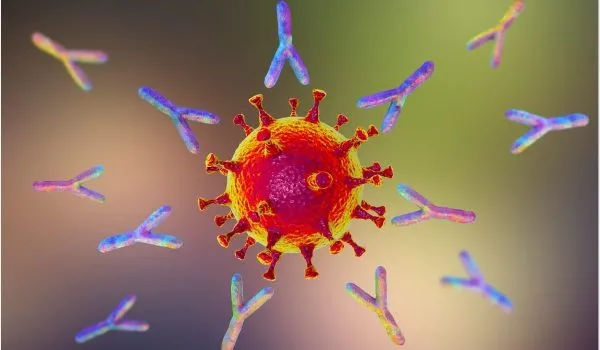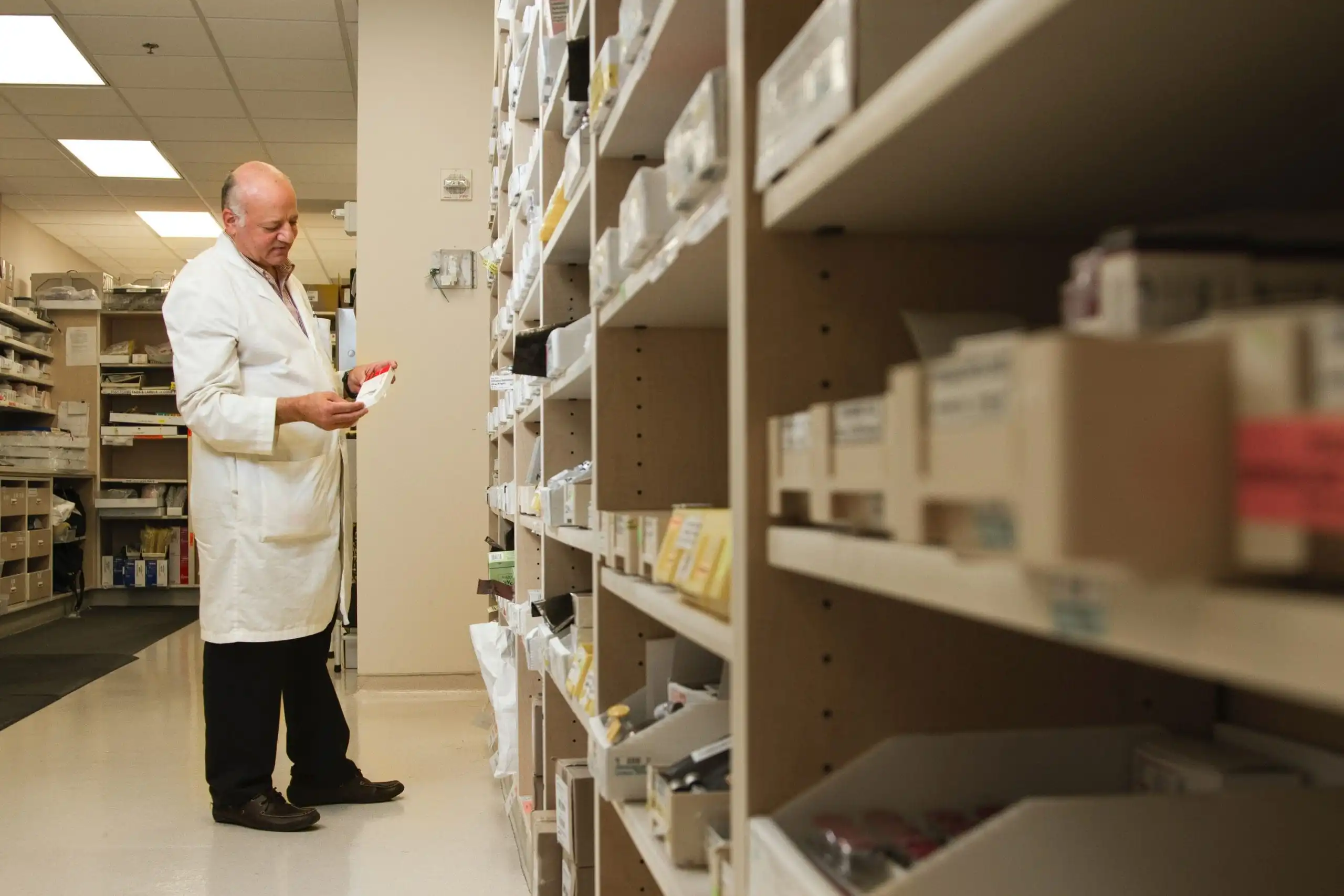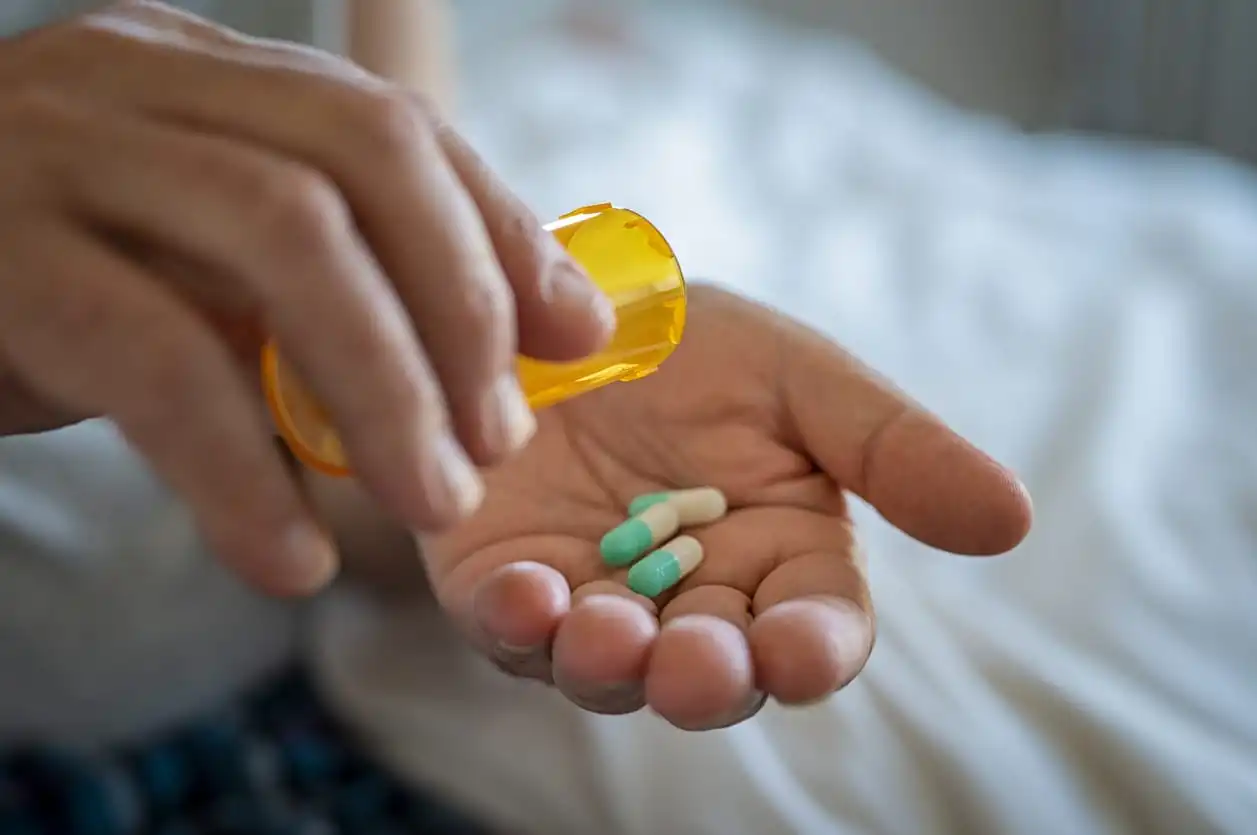
Monoclonal antibodies are laboratory-produced antibodies cloned from white blood cells. Used in medical research and treatment, monoclonal antibodies aim to mimic the action of naturally-produced antibodies created by the immune system after a pathogenic infection.
What are Antibodies?
Antibodies (Ab), also known as immunoglobulins, are Y-shaped glycoproteins belonging to the immunoglobulin superfamily. The immune system uses antibodies to identify and neutralize foreign objects such as viruses and pathogenic bacteria.
An antibody works by locking to a pathogen via its Y-shaped tips. Each tip contains a paratope (similar to a lock) that binds to the pathogen’s specific epitope (or key). This binding mechanism allows the antibody to tag the microbe, signaling the immune system to neutralize it directly. Since there are millions of antigen types, antibodies have equally diverse antigen-binding sites that allow the immune system to recognize and neutralize millions of different pathogens.
While paratopes vary significantly, the stem portion of the antibody occurs in several variants that define its class or isotype: IgA, IgD, IgE, IgG, or IgM. In addition, this region includes sites involved in interactions with other immune system components. The class is determined by multiple factors that include: structural features, the function that gets triggered after the paratope binds to an antigen, where the antibody is released in the body, and the stage of the response.
Get your requested raw materials quotation
Role in the Immune System
Antibodies, together with B and T cells, form the most critical part of the adaptive immune system. There are two forms of antibodies: one attached to a B cell, and a soluble form that remains unattached and is found in blood plasma and other extracellular fluids.
Antibodies that attach to the surface of the B cell, referred to as B-cell receptors, stimulate the B cell to activate, proliferate, and differentiate into either plasma cells that secrete soluble antibodies with the identical paratope, or memory B cells that live in the body to provide long-lasting immunity to the antigen. Soluble antibodies that are released into blood, tissue fluids, and other secretions (also known as humors) lead to antibody-mediated immunity, and are considered a part of humoral immunity.
Some specific antibodies associated with diseases include:
- HLA antibodies – found in some women during pregnancy
- IgG antibodies – the most common antibody type, forming approximately 75% of serum antibodies in humans that remain after an infection
- IgM antibodies – the first antibody produced by the immune system after a virus attacks
- Treponema pallidum antibodies – related to a Syphilis infection
- HSV antibodies – associated with the Herpes virus
Antibody Testing
Antibodies demonstrate the body’s efforts to fight infections from diseases occurring naturally or by vaccination. Once created, antibodies protect from future infections and prevent severe future illness. Antibody tests are not recommended to diagnose current infection because it may take up to 21 days for the body to manufacture antibodies following an illness. While naturally-occurring antibodies demonstrate protection from a disease for a lifetime, vaccinated individuals can become reinfected after an injection.
Get your requested raw materials quotation
What are Monoclonal Antibodies?
Monoclonal antibodies (mAb or moAb) are antibodies created through the cloning of white blood cells. Subsequent antibodies derived in this fashion are identical to the unique parent cell. Therefore, they have a monovalent affinity by binding only to the same epitope, or part of the antigen recognized by the antibody. In contrast, polyclonal antibodies are made by multiple antibody-secreting plasma cell lineages and can bind to various epitopes.
Bispecific monoclonal antibodies can bind to two epitopes by increasing the therapeutic targets of a single monoclonal antibody. Production of monoclonal antibodies that bind to any specific substance is possible for the purpose of detection and purification, leading to the creation of tools in molecular biology, biochemistry, and medicine.
Monoclonal Antibodies in Medicine
COVID-19
Monoclonal antibodies have been created to combat symptoms from SARS-COV-2, the virus that allegedly causes symptoms associated with COVID-19.
Information on SARS-CoV was initially published by Dr. Zheng-Li Shi, director of the Wuhan Institute of Virology, where researchers first identified the virus in a solitary bat cave in the Yunnan province of China, approximately 3,200 km (2,000) miles from the city of Fudan. Roughly three years later, SARS-CoV-2 was discovered 1,600 km (1000 miles) from the caves, across the Yangtze river next to the Wuhan Institute of Virology, where Shi and colleagues immediately sequenced the genome.
The SARS-CoV-2 genome encodes four major structural proteins that include spike (S), envelope (E), membrane (M), and nucleocapsid (N), in addition to accessory and nonstructural proteins. Anti-SARS-CoV-2 monoclonal antibody treatments that specifically target the spike protein have been shown to have a clinical benefit in treating SARS-CoV-2, specifically:
Bamlanivimab plus etesevimab – neutralizing mAbs that bind to different epitopes that concurrently overlap in the RBD spike protein of SARS-CoV-2.
Casirivimab plus imdevimab – recombinant human mAbs that bind to non-overlapping epitopes of the RBD spike protein of SARS-CoV-2.
Sotrovimab: identified initially from a SARS-CoV patient in 2003 that targets an epitope in the RBD of the spike protein conserved between SARS-CoV and SARS-CoV-2.
Monoclonal Antibodies (Covid) Side Effects
Commonly reported side effects for bamlanivimab/etesevimab include:
- Fever
- Tiredness
- Difficulty breathing
- Rapid/slow heart rate
- Weakness
- Confusion
Commonly reported side effects for casirivimab/imdevimab include:
- Nausea
- Pneumonia
- Vomiting
- Hyperglycemia
Other Monoclonal Antibody Treatments
Monoclonal antibodies are used to treat other conditions, including:
- Cancer
- Cardiovascular disease
- Psoriasis
- Systemic lupus erythematosus
- Crohn’s disease
- Rheumatoid arthritis
- Multiple sclerosis
- Ulcerative colitis
- Thyroid disorders
Monoclonal Antibodies FAQ
Antibodies are produced by white blood cells.
Natural antibodies last a lifetime, while vaccine-induced antibody responses last several months.
Monoclonal antibodies are synthetic antibodies cloned from white blood cells used to treat conditions that include cancer, cardiovascular disease, psoriasis, systemic lupus erythematosus, rheumatoid arthritis, Crohn’s disease, multiple sclerosis, thyroid disorders, and ulcerative colitis.
Vaccine-produced antibodies last several months, while natural immunity from a COVID infection lasts forever.




